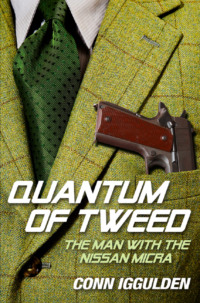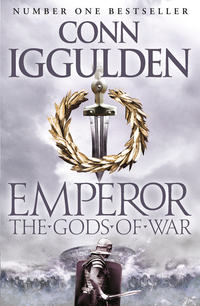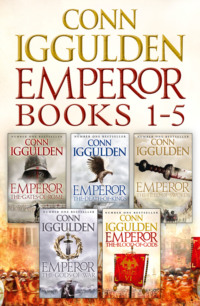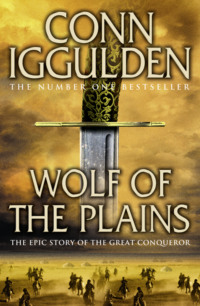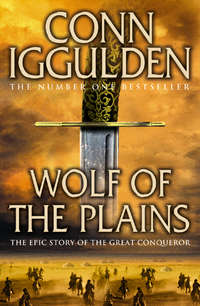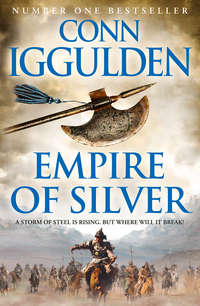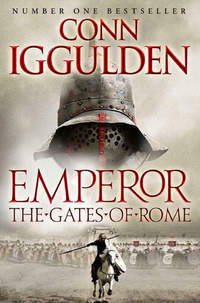
Полная версия
Conqueror
The smell of aloes wood had faded since the morning. The city reeked again, reminding Mongke of a healing tent after a battle. He thought sourly of festering wounds he had seen, fat and shiny with pus. It took courage and a steady hand to drain such a wound: a gash and a sharp pain to let the healing begin. He smiled as he walked. He would be that hand.
The entire city was in uproar by the time darkness came. On Mongke’s orders, warriors had entered Karakorum in force, groups of ten or twenty walking every street and examining the possessions of thousands of families. At the first hint of resistance, they dragged owners into the street and beat them publicly, leaving them on the cobbles until their relatives dared to come out and take them back. Some lay where they had been thrown all night.
Even sickbeds were searched for hidden gold or silver, with the occupants tossed out with their sheets and made to stand in the cold until the warriors were satisfied. There were many of those, coughing listlessly and still feverish as they stood with blank eyes. Chin families suffered more than other groups, though the Moslem jewellers lost all their stock in a single night, from raw materials to finished items ready for sale. In theory, all things would be accounted, but the reality was that anything of value disappeared into the deels the warriors wore over their armour.
Dawn brought no respite and only revealed the destruction. There was at least one sprawled body in every street and the weeping of women and children could be heard across Karakorum.
The palace was the centre of it, beginning with a search of the sumptuous rooms that had belonged to the khan’s staff and favourites. Wives were either claimed by Mongke’s officers or put outside the walls to join their husbands. The trappings of status were ripped down, from tapestries to Buddhist statuary. There at least, Mongke’s eye could be felt and what treasures they found were dutifully collected and piled in the storerooms below. More were burnt in great fires on the streets.
As evening came on his second day back in the city, Mongke summoned his two most trusted generals to the audience room in the palace. Ilugei and Noyan were Mongols in his mould, strong men who had grown up with a bow in their hands. Neither man affected any sign of Chin culture and already those who had done so were shaving their heads and ridding themselves of the artefacts of that nation. The orlok’s will had been made clear enough when he whipped the Chin scribes from the city.
Simply meeting his officers without Chin scribes to record was a break with Guyuk’s court. Mongke knew Yao Shu was outside, but he would let the old man wait until the real business was concluded. He was not filled with excitement at the need to meet Guyuk’s debts. The sky father alone knew how the khan had managed to borrow so much against a treasury that stood empty. Already there had been nervous delegations of merchants coming to the palace to collect gold for their paper. Mongke grimaced at the thought. With the wealth he had wrenched out of the foreigners in Karakorum, he could meet most of Guyuk’s paper promises, though it would leave him without funds for months. His honour demanded he do so, as well as the practical consideration that he needed the merchants’ goodwill and their trade. It seemed the role of a khan involved more than winning battles.
Mongke was not yet sure if he had acted correctly in removing the palace staff from their soft positions. Part of him suspected Yao Shu brought every small problem to him as a way of criticising what he had done. Even so, the memory of whipping them from the city was immensely satisfying. He had needed to show he was no Guyuk, that the city would be run on Mongol lines.
‘You have sent men to Torogene?’ Mongke asked Noyan.
The general stood proudly before him in a traditional deel, his skin greasy with fresh mutton fat. He wore no armour, though Mongke had allowed him to keep his sword for the meeting. He would not fear his own men, as Guyuk and Ogedai had.
‘I have, my lord. They will report directly to me when it is done.’
‘And Guyuk’s wife, Oghul Khaimish?’ Mongke said, his eyes passing on to Ilugei.
He tightened his mouth before replying. ‘That is not … settled yet, my lord. I had men go to her rooms, but they were barred and I thought you would want it handled quietly. She will have to come out tomorrow.’
Mongke grew very still and Ilugei began to sweat under the yellow gaze. At last the orlok nodded.
‘How you carry out my orders is your concern, Ilugei. Bring me the news when you have it.’
‘Yes, my lord,’ Ilugei said, breathing out in relief. As Mongke looked away, Ilugei spoke again. ‘She is … popular in the city, my lord. The news of her pregnancy is everywhere. There could be unrest.’
Mongke glared at the sweating man.
‘Then take her by night. Make her vanish, Ilugei. You have your orders.’
‘Yes, lord.’ Ilugei chewed his lip as he thought. ‘She is never without her two companions, lord. I have heard rumours that the old one knows herbs and ancient rites. I wonder if she has infected Oghul Khaimish with her spells and words?’
‘I have heard nothing …’ Mongke broke off. ‘Yes, Ilugei. That will serve. Find out the truth of it.’ To be accused of witchcraft carried a terrible penalty. There would be no one willing to stand up for Oghul Khaimish once that was suspected.
Mongke found himself weary as he dismissed his officers and let Yao Shu in. The days were long for one who would be khan, but he had found his purpose. The wound would be cut and it would bleed itself clean. In just a few months, he would rule a Mongol empire without the corruption of the Chin at its heart. It was a fine dream and his eyes were bright with satisfaction as Yao Shu bowed before him.
CHAPTER ELEVEN

In her husband’s summer palace, Torogene sat in a silent hall, lit by a single, gently hissing lamp. She was dressed neatly in a white deel and new shoes of stitched white linen. Her grey hair was tied back tightly, so that not even a wisp escaped the twin clasps. She wore no jewels, as she had given them all away. At such a time, it was hard to look back on her life, but she could not focus on the present. Though her eyes were still swollen with weeping for Guyuk, she had found something resembling calm. Her servants were all gone. When the first one had reported soldiers coming along the road from Karakorum, she had felt her heart skip in her chest. There had been twelve servants, some of whom had been with her for decades. With tears, she had given them whatever silver and gold she could find and sent them away. They would only have been killed when the soldiers arrived, she was sure of that. News of Mongke’s death lists had already reached her, with a few details of the executions in the city. Mongke was clearing away anyone who had supported Guyuk as khan and she was not surprised he had sent soldiers to her, only weary.
When the last of her servants had gone, Torogene had found herself a quiet place in the summer palace to watch the sun set. She was too old to run, even if she thought she could have lost her pursuers. It was strange to see death as finally inevitable, but she found she could put aside all her fear and anger in the face of it. The grief for her beloved son was still fresh, perhaps too great to allow any sorrow for herself. She was worn down, as one who has survived a storm and lay sprawled on rocks, too dazed to do more than breathe and stare.
In the darkness outside, she heard voices as Mongke’s men rode in and dismounted. She could hear every whisper of sound, from the crunch of their feet on the stones, to the jingle of their harness and armour. Torogene raised her head, thinking back over better years. Her husband Ogedai had been a fine man, a fine khan, struck down too early by a vengeful fate. If he had lived … She sighed. If he had lived, she would not be alone and waiting for death in a palace that had once been a happy home. She thought suddenly of the roses Ogedai had given her. They would run wild in the gardens without someone to tend them. Her mind flitted from one thing to another, always listening for the steps coming closer.
She did not know if Ogedai would have been proud of Guyuk in the end. Her son had not been a great man. With all her future stripped away, she saw the past more clearly and there were many regrets, many paths she wished she had not taken. It was a foolish thing to look back and wish things had been different, but she could not help it.
When she heard a boot scrape at the outer door of the hall, her thoughts tore into rags and she looked up, suddenly afraid. Her hands twisted together in her lap as the warriors slid into the room, one after the other. They walked lightly, ready with weapons in case they were attacked. She could almost laugh at their caution. Slowly, she stood, feeling her knees and back protest.
The officer came to her, looking into her eyes with a puzzled expression.
‘You are alone, mistress?’ he asked.
For a moment, her eyes shone.
‘I am not alone. Do you not see them? My husband, Ogedai Khan, stands on my right hand. My son, Guyuk Khan, stands on my left. Do you not see those men watching what you do?’
The officer paled slightly, his eyes sliding right and left as if he could see the spirits watching over her. He grimaced, aware that his companions would be listening and every word reported to Mongke.
‘I have my orders, mistress,’ he said, almost apologetically.
Torogene raised her head further, standing as straight as she could.
‘I am brought down by dogs,’ she muttered, contempt banishing her fear. Her voice was strong as she spoke again. ‘There is a price for all things, soldier.’ She looked up, as if she could see through the stone roof above their heads. ‘Mongke Khan will fall. His eyes will fill with blood and he will not know rest or sleep or peace. He will live in pain and sickness and at the end …’
The officer drew his sword and brought it across her throat in one swift movement. She fell with a groan, suddenly limp as blood poured out of her and spattered on his boots. The watching men said nothing as they waited for her to die. When it was finished, they left quietly, unnerved in the silence. They did not look at each other as they mounted their horses and rode away.
As he faced Mongke, General Ilugei found himself strangely troubled, an unusual emotion for him. He knew it was a sound tactic for a new leader to sweep away all those who had supported his predecessor. Beyond that, it was the merest common sense to remove anyone with a blood tie to the previous regime. There would be no rebellions in the future, as forgotten children grew to manhood and learned to hate. The lessons of Genghis’ own life had been learned by his descendants.
Ilugei had taken particular pleasure in putting his own enemies on the lists he prepared for Mongke, a level of power he had never enjoyed before. He simply spoke a name to a scribe and within a day the khan’s loyal guards tracked them down and carried out the execution. There was no appeal against the lists.
Yet what Ilugei had seen that morning had unnerved him, ruining his usual composure. He had known still-born children before. His own wives had given birth to four of them over the years. Perhaps because of that, the sight of the tiny flopping body had sickened him. He suspected Mongke would think it a weakness in him, so he kept his voice calm, sounding utterly indifferent as he reported.
‘I think Guyuk’s wife may have lost her mind, my lord,’ he said to Mongke. ‘She talked and wept like a child herself. All the time she cradled the dead infant as if it was still alive.’
Mongke bit his lower lip in thought, irritated that such a simple thing should become so complicated. The heir had been the threat. Without one, he might have sent Oghul Khaimish back to her family. He was khan in all but name, he reminded himself. Yet his new authority stretched only so far. Silently, he cursed Ilugei’s man for going into such detail of her crimes. A public accusation of witchcraft could not be ignored. He clenched his fist, thinking of a thousand other things he had to do that day. Forty-three of Guyuk’s closest followers had been executed in just a few days, their blood still wet on the training ground of the city. More would follow in the days to come as he lanced the boil in Karakorum.
‘Let it stand,’ he said at last. ‘Add her name to the list and let there be an ending.’
Ilugei bowed his head, hiding his own obscure disappointment.
‘Your will, my lord.’
CHAPTER TWELVE

Oghul Khaimish stood on the banks of the Orkhon river, watching the dark waters flowing. Her hands were bound behind her, grown fat and numb in the bonds. Two men stood at her sides to prevent her throwing herself in before it was time. In the dawn cold, she shivered slightly, trying to control the terror that threatened to steal away her dignity.
Mongke was there, standing with some of his favourites. She saw him smile at something one of his officers said. Gone were the days when they would have made a bright and lively scene. To a man, his warriors and senior men were dressed in simple deels, without decoration beyond a little stitching. Most wore the traditional Mongol hairstyles, with a shaven scalp and topknot. Their faces shone with fresh mutton fat. Only Yao Shu and his few remaining Chin scribes were unarmed. The rest wore long swords that reached almost to their ankles, heavy cavalry blades designed for cutting down. Karakorum had its own foundry, where armourers sweated all day at their fires. It was no secret that Mongke was preparing for war once he had butchered the last of Guyuk’s supporters and friends.
Her husband’s supporters and friends. Oghul could not feel anything on that day, as if she had grown a protective sheath over her heart. She had lost too much in too short a time and she still reeled from all that had happened. She could not bear to look at her old servant Bayarmaa, trussed with a dozen others as they waited in sullen silence for Mongke to order their deaths.
The orlok seemed in no hurry. He was a solid figure at the centre of them, almost half as wide again as the largest warrior in his retinue. Despite his bulk, he moved easily, a man secure in his strength and still young enough to enjoy it. Oghul stood and dreamed of him being struck dead in front of them all, but it was just a fantasy. Mongke was oblivious to the misery in the huddled rank of prisoners. Even as she watched, he accepted a cup of airag from a servant, laughing with his friends. Somehow, that burned worse than anything, that he should care so little for their fate even as they stood on their last day. Oghul saw one of the bound men had lost control of his bladder, so that a thin stream of urine darkened his leggings and pooled at his feet. He did not seem to notice, his eyes already blank. She looked away, trying to find her own courage. All that man had to fear was a knife. For her, it would be slow.
It was no blessing that Mongke had agreed the wife of a khan was one of royal blood. She looked at the dark canal Ogedai had built and shivered again. She could feel the urge to empty her own bladder, though she had been careful not to drink that morning. Her face and hands felt cold as the blood was leached away and her heartbeat increased. Even so, she was sweating and the cloth at her armpits was already wet. She focused on the small changes in her body as she waited, trying desperately to distract herself.
Mongke finished his airag and tossed the cup back to the servant. He nodded to one of his officers and the man bellowed a command to come to order. All the men there straightened, even some of the prisoners, standing as tall as they could in their bonds. Oghul shook her head at the poor fools. Did they expect to impress their tormentors and gain mercy? There was none to be had.
Yao Shu was present and Oghul thought she could see the signs of great strain on the old man. She had heard the chancellor had been absent for the first executions, claiming illness. With a delicate feel for cruelty, Mongke had sensed his discomfort. Now Yao Shu played a part in all the deaths. Oghul listened to the list of names, watching sadly as each prisoner lifted his head slightly as he heard his own.
After the endless wait, the procedure suddenly started to go quickly. The prisoners were kicked to their knees and a very young warrior stepped from Mongke’s group, drawing a long sword. Oghul knew he would have earned the duty as a reward for some service to Mongke. Many of the warriors desired the task if they had not yet been blooded in battle. Oghul recalled that Genghis had killed tens of thousands in one foreign city for no other purpose than to train his men in the reality of killing.
She did not listen to Yao Shu’s shaking voice as he called out the charges, reading from the page in front of him. The executioner braced himself over the first kneeling figure, determined to make a good show in front of Mongke.
Oghul looked over the river as the killing began, ignoring the shouts of approval and laughter from among Mongke’s group. Bayarmaa was fourth in line and Oghul had to force herself to look as the old woman’s turn came. Her crime had only been by association with Oghul Khaimish, named as the one who corrupted the khan’s wife to dark magic.
Bayarmaa had not bowed her head or stretched her neck and the swordsman spoke harshly to her. She ignored him, looking over to where Oghul stood. They shared a glance and Bayarmaa smiled before she was killed in two hacking blows.
Oghul looked back again to the dark waters until it was over. When the last of them was dead, she turned to see the young warrior examining his blade with a stricken expression. No doubt it had chipped on bone. Mongke came forward and clapped him on the back, pressing a fresh cup of airag into his hands while Oghul watched in sullen hatred. When Mongke looked over at her, she felt her heart constrict in panic and her numb hands twisted in the rope.
Yao Shu spoke her name. This time there was definitely a quaver in his voice and even Mongke frowned at him. Genghis had decreed that royal blood would never be shed by his people, but the alternative filled Oghul with terror.
‘Oghul Khaimish, who has brought infamy to the name of the khan with witchcraft and foul practices, even unto … the killing of her own child.’
Oghul’s hands curled into fists at the last, reaching into the coldness within to keep her on her feet.
When Yao Shu had finished reading the charges, he asked if anyone would step forward and speak in her defence. The smell of blood was strong on the air and no one moved. Mongke nodded to the warriors standing with her.
Oghul stood shaking as she was lifted off her feet and laid on a thick mat of felt. She sensed muscles twitching in her legs, beyond her control. Her body wanted to run and could not. Yao Shu suddenly began to chant a prayer for her, his voice breaking. Mongke glared at him, but the old man spoke on.
The warriors rolled her over in the felt, so that the musty material pressed against her face and filled her lungs with dust. Panic swelled in her and she cried out, her gasping breath muffled in the cloth. She felt the tugging movement as they bound the roll of felt in reins of leather, yanking the buckles tight. She would not cry for help with Mongke listening, but she could not hold back a moan of fear, dragged from her like an animal in a trap. The stillness seemed to go on for ever. She could hear her heart thud in her chest and ears, a drum pulsing. Suddenly she was moving, turning over slowly as they rolled her towards the canal.
Freezing water flooded in and she struggled wildly then, seeing silver bubbles erupt all around her. The roll of felt sank quickly. She held her breath as long as she could.
Sorhatani lay with just a sheet over her, though the night was cold. Kublai knelt at her side and when he took her hand he almost recoiled at the heat from it. The fever had burnt its path through Karakorum and there were fewer new cases reported each day. Every summer it was the same. A few dozen or a few hundred would succumb to some pestilence. Very often it was those who had survived the last one, still weak and thin.
Kublai felt tears prick his eyes as his mother coughed, the sound building until she was choking, her back arched and her muscles standing out in narrow lines. He waited until she could draw a shuddering breath. She looked embarrassed that he had seen her so racked and she smiled weakly at him, her eyes glassy with fever.
‘Go on,’ she said.
‘Yao Shu has locked himself in his rooms. I’ve never seen him so distraught. It was not a good death.’
‘No such thing,’ Sorhatani said, wheezing. ‘It is never kind, Kublai. All we can do is ignore it until the time comes.’ The effort of speaking was enormous and he tried to stop her, but she waved his objections aside. ‘People do that so well, Kublai. They live knowing they will die, but no matter how many times they say the words, they don’t truly believe it. They think somehow that they will be the one death passes by, that they will live and live and never grow old.’ She coughed again and Kublai winced at the sound, waiting patiently until she could breathe once more.
‘Even now, I expect to … live, Kublai. I am a foolish old woman.’
‘Not foolish, or old,’ he said softly. ‘And I need you still. What would I do without you to talk to?’ He saw her smile again, but her skin wrinkled like old cloth.
‘I don’t plan … on joining your father tonight. I’d like to tell Mongke what I think of his death lists.’
Kublai’s expression grew sour.
‘From what I’ve heard, he has impressed the princes and generals. They are the sort of men who admire butchery. They are saying he is a new Genghis, mother.’
‘Perhaps … he is,’ she said, choking. Kublai passed a cup of apple juice into her hands and she sipped it with her eyes closed.
‘He could have banished Oghul Khaimish and her old servant,’ Kublai said. He had studied the life of his grandfather Genghis and he suspected his mother was right, but that did not remove the bitter taste. His brother had achieved a reputation for ruthlessness with fewer than a hundred deaths. It had certainly not hurt him with the nation. They looked to him as one who would bring a new era of conquest and expansion. For all his misgivings and personal dislike, Kublai felt they were probably right.
‘He will be khan, Kublai. You must not question what he does. He is no Guyuk – remember that. Mongke is strong.’
‘And stupid,’ he muttered.
His mother laughed and the coughing fit that followed was the worst he had seen. It went on and on and when she dabbed at her mouth with the sheet, he saw a spot of blood on the cloth. He could not drag his eyes away from it.
When the coughing fit passed, she shook her head, her voice barely a whisper.
‘He is no fool, Kublai. He understands far better than you realise. The khan’s vast armies cannot return to being herdsmen, not any more. He is riding the tiger now, my son. He dare not climb down.’
Kublai frowned, irritated that his mother seemed to be supporting Mongke in everything. He had wanted to share his anger with her, not have her excuse his brother’s acts. Before he spoke again, understanding came to him. Sorhatani had been his friend as well as his mother, but she would never see clearly with her sons. It was a blind spot in her. With sadness, he knew all he could achieve would be to hurt her. He closed his mouth on all the arguments he might have made and remained silent.
‘I will think on it,’ he said. ‘Now get well, mother. You will want to be there, to see Mongke made khan.’


